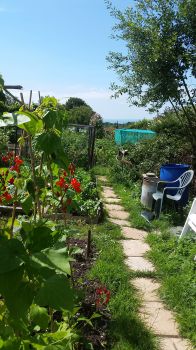Home grown produce in urban areas could improve food security, after promising results in Brighton study
By: Tom Furnival-Adams
Last updated: Wednesday, 5 December 2018


A citizen science project which saw volunteers monitor pollinators, pests and produce in their allotments, has found that home-growers harvest an average of £550 worth of food each summer, according to results compiled by researchers at the University of Sussex.
In one case, the amount of food grown by one volunteer in just one season was 245kg, which equates to a staggering £2300 worth of produce.
Over half of this was produced directly thanks to insect pollination.
A total of 33 home-growers in Brighton and Hove took part in the Team PollinATE project, which aimed to understand more about food grown in cities and the need for pollinating insects.
Professor Dave Goulson and Dr Beth Nicholls, who were overseeing the project, wanted to find out which insects were visiting flowering crops in urban areas and whether pollinator populations were large enough to pollinate the food grown, with an overall view to determining whether urban agriculture and home-growing produce could help improve food security.
Over the two-year period, volunteers conducted more than 700 surveys of pollinators visiting their crops, counting over 2,000 insects.
Each volunteer managed to grow around 70kg of insect pollinated crops on average, which included pumpkins (20kg per person on average), tomatoes (15kg per person on average) and fruit such as apples and plums (7kg per person on average).
Dr Nicholls, a research fellow at the University of Sussex, said: "Factoring in the extent to which each crop type is dependent on insects for pollination, we estimate that on average, around 70% of the total crop yield is 'owed' to pollinators.
"That equates to around £380 worth of produce per grower per year.
"It's just a start but it shows the potential for home grown produce, and the significant need for pollinators when producing our own food in cities."
Despite the fact that around 50% of the world's population live in urban areas, urban agriculture is still largely unmonitored. However, researchers believe that it could provide up to 15-20% of the world's food.
Local studies, like this one in Brighton, suggest home growing food in urban areas could be one way to help with food security as productivity rates were fairly high.
When taking into consideration the productivity of urban growing spaces, the Team PollinATE volunteers were producing approximately 1kg of insect-pollinated crops per square metre. This is equivalent to 10 tonnes per hectare, which is well within the productivity range of a conventional farm.
As allotment space in Brighton and Hove is approximately 50 hectares, researchers therefore believe that the city has the capacity to grow at least 500 tonnes of food per year.
This figure could be significantly higher when factoring in crops not reliant on pollinators such as root vegetables and salad crops, as well as those people growing produce in their own gardens or balconies.
“Our results suggest that allotments contribute significantly to food production, with the added advantages that food produced in this way is fresh, seasonal, zero food-miles and without requiring packaging,” said Professor Dave Goulson.
“Finding allotment space for those that want one should be a priority.”
Dr Nicholls added: “Currently the UK produces only around 60% of the food we consume, importing close to £8 billion worth of fruit and vegetables every year.
“Our results, collected in partnership with growers themselves, suggest that green spaces in cities, such as allotments and community gardens, could play an important role in meeting that demand, improving food security through reducing our reliance on imports."

